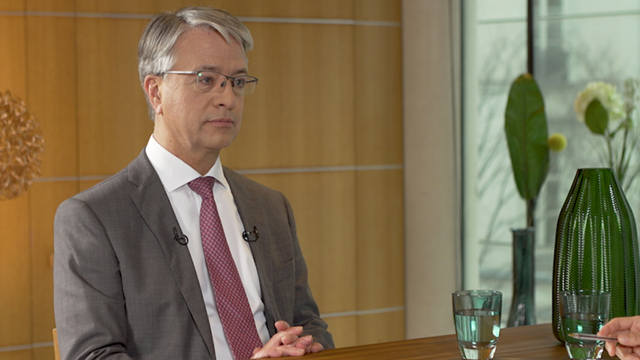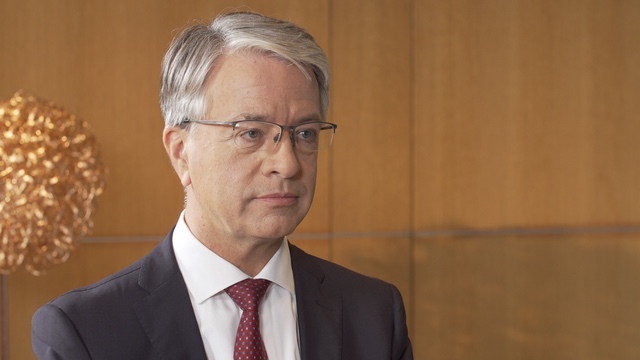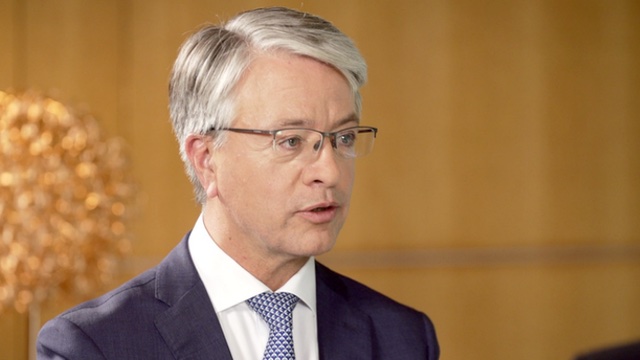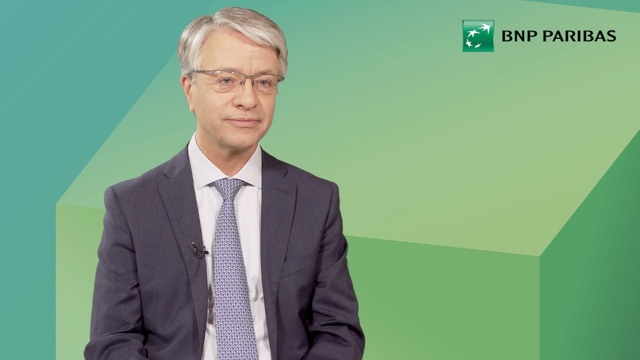EuroBusiness Media (EBM): BNP Paribas, one of the Europe’s largest banks, reports results for the full year 2011. Jean-Laurent Bonnafé, welcome. You are the CEO of BNP Paribas. What are your comments on the Group's performance in the fourth quarter and for the full year?
Jean-Laurent Bonnafé: The fourth quarter was difficult, with tough market conditions impacting CIB and asset management, and an additional impairment on Greek debt, which led us to set aside 600 million euros. Despite all this, BNP Paribas performed well, confirming its strong resilience. In the fourth quarter, revenues reached 9.7 billion euros with costs down by 3%, while the cost of risk - excluding Greece - continued to decline.
Despite this, the Group confirmed its profit-generation capacity, closing the quarter with a net result of 765 million euros.Now, moving on to the full year, revenues topped 42 billion, costs were reduced to 26 billion and cost of risk – again excluding Greek impairment - was 26% lower.
The overall impact for the year related to Greek debt impairment came to 3.4 billion euros.Hence, net income for the year exceeded 6 billion euros, generating a ROE of 8.8% and a Return on Tangible Equity of 11.1%. I think this was a strong performance, relative to our peers.
BNP Paribas has continued to create value for all its stakeholders, as shown by the additional increase in the book value per share to 58.2 euros, up 5% on the previous year.
EBM: In view of the mounting requirements in terms of regulations and capital consumption, should we expect an additional restructuring wave this year and possibly even higher capital ratio targets?
Jean-Laurent Bonnafé: I would like to remind you that BNP Paribas has doubled its common equity Tier 1 capital over the past three years. On top of that, we launched quite a significant deleveraging plan last summer that is being implemented at a faster pace than anticipated in most areas.
At year-end 2011, we have already reached and exceeded six months in advance the 9% target fixed by the EBA.
Hence, we are well on track to achieve a 9% common equity Tier 1 ratio under fully-loaded Basel 3 as early as by 1st January 2013.
I believe that the actions we are putting in place will ensure that the Group emerges from the current crisis stronger with a solid base in terms of solvency.
EBM: US banks are not forced to operate under the same regulatory constraints as European banks. Therefore, are US banks to be feared as major competitors this year?
Jean-Laurent Bonnafé: The Federal Reserve is a member of the Basel committee and the US has committed to move to Basel 3 but probably with a different timing. For the time being, they are in the process of implementing the Dodd-Franck Act which is another type of regulatory constraint. We really hope that they will comply swiftly with Basel 3. This is a condition to have a level playing field between US and European banks.
As for CIB activities as a whole, we will leverage on our leading positions and recognised expertise to keep - and possibly increase - our market shares.
EBM: In this changing environment, are you anticipating more disintermediation by corporates, that might increasingly choose to tap the funding available to them through their own ratings rather than fund themselves through banks?
Jean-Laurent Bonnafé: I believe this is already happening and will probably gather pace going forward. However, change often represents an opportunity, and BNP Paribas - thanks to its sizeable Fixed Income platform - is well placed to benefit from this trend.
Indeed, BNP Paribas is number 1 in All Bonds issues in Euros and number 2 for All Corporate Bonds in Euros. Moreover, since 2010 we have brought 37 corporate clients to the market for their first issue.
EBM: Following European austerity measures and the recessionary environment, and given that many of your competitors have suspended their dividend, will you pay a dividend this year, and if so in what order of magnitude?
Jean-Laurent Bonnafé: We have proposed to the Board a dividend payment of 1.2 euros per share corresponding to a 25% pay-out. Moreover, we offer the option of a payment in shares. This means that at least three quarters of 2011 earnings shall be reinvested in the company to bolster our capacity to finance our clients and to strengthen solvency.
Thus, BNP Paribas stands out as one of the few banks paying a significant dividend in 2011.
I would like to remind you that, thanks to its earnings generation capacity, BNP Paribas has continued to remunerate its shareholders year after year throughout the crisis.
EBM: Looking at retail banking activity, your French, Belgian, Luxemburg and Italian retail business will most likely suffer from the European economic slowdown, with lower top line growth and an increase in loan-loss provisions, as well as new funding constraints. How do you expect your retail banking to perform this year?
Jean-Laurent Bonnafé: Our four domestic markets performed well in 2011 with a 15% increase of pre-tax income, despite a challenging environment, particularly in Italy.
Revenues increased in all markets driven by sustained volume growth. Loans rose on average by 5.1% and deposits grew by 6.4%.
Efficiency improved further as shown by a lower cost-to-income ratio in all four countries, despite the ongoing investments to develop the commercial set up.
The cost of risk decreased everywhere, although structurally the level in Italy remains significantly higher than in France and BeLux.
In 2012, the economic slowdown coupled with higher funding costs will make the environment more challenging. However, in view of the combined benefit of repricing actions already being implemented, and a world-class product factory, I am convinced that our domestic markets will remain significant contributors to the Group profitability.
EBM: Regarding corporate and investment banking, your deleveraging plan will impact revenues. Could you update us on where you stand vis-à-vis your announced deleveraging plan and if it’s progressing as planned? Is there a chance that we will see repricing, especially from global players like yourself, and therefore higher margins?
Jean-Laurent Bonnafé: The implementation of our deleveraging plan is proceeding swiftly through a proactive management. The overall target is to achieve a benefit of 100 basis points of Solvency ratio by year-end 2012. By the end of 2011 we have already booked a 32 basis point improvement: that is roughly one third of the total plan.
In terms of risk-weighted assets reduction, as you know the largest share is represented by CIB. Here we have reduced by 22 billion euros, equally split between market activities and financing businesses. On market activities we are adapting operations to the new regulations, whereas on financing businesses we are proactively decreasing the exposure.
On the CIB US dollar deleveraging we are way ahead, having reduced our funding needs in dollars by 57 billion out of a target of 60, and having also slightly increased the target to 65 billion dollars.
As for net margins, they are clearly under pressure due to the higher cost of funding and cost of capital. But this is the case for all banks. New regulations and constraints coupled with the deleveraging being implemented by many players have triggered repricing opportunities for global players like us. But this process will take some time to reach its full effect in the P&L.
EBM: Your Investment Solutions division has suffered from sizeable outflows in asset management but has proven resilient in other areas. How do you explain this and how do you see the business model evolving in this area of business?
Jean-Laurent Bonnafé: When looking at Investment Solutions, asset management has been penalised by tough market conditions and generalised outflows at industry level in continental Europe.
However, it is worth noting two things:
- First) a significant part of the outflows were in low margin products, such as money market funds, and
- Second) that we actually had positive inflows in Asia-Pacific, in the Middle East and in Latin America.
Thus, in asset management we are implementing a plan to adapt the business to the new environment by streamlining operations. Most of the restructuring costs have already been passed in the fourth quarter 2011 and we expect to reduce the cost base by 10% in 2012.
All other areas of activity, namely Wealth Management, Personal Investors, Real Estate, and Insurance, actually showed net inflows in the year, leveraging on recent commercial investments and geographical diversification.
Lastly Securities Services succeeded in increasing its assets thanks to the gain of new mandates.
EBM: You reduced your sovereign bond exposure in 2011. Are you going to continue to do so in 2012, and what other types of assets are you investing in instead?
Jean-Laurent Bonnafé: These bonds were held for managing liquidity and hedging and not for investment purposes.
The reason we decided to reduce our global Sovereign exposure in 2011 was solely in order to limit the sensitivity of our Tier 1 ratio to the mark-to-market of our Sovereign debt portfolio. Hence, we have acted in anticipation of the full implementation of Basel 3 rules. For the time being, part of the proceeds is replaced by deposits with Central Banks to ensure short-term liquidity.
We shall continue to manage our Sovereign exposure proactively on an opportunistic basis in order to minimise the volatility of our capital ratios.
EBM: Jean-Laurent Bonnafé, CEO of BNP Paribas, thank you very much!
Jean-Laurent Bonnafé: You’re welcome!






